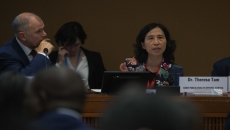Expectant mothers who have been left out of a key COVID-19 emergency-aid program will receive financial help, and will qualify for federal benefits when they go on maternity leave, says Canada's employment minister. Pregnant women who applied for employment insurance at the outset of the pandemic have found that they weren't automatically transferred over to the Canada Emergency Response Benefit when it became available earlier this month.
Many are still waiting for their first benefit payment, and are worried they won't work enough hours to qualify for EI maternity and parental benefits. Employment Minister Carla Qualtrough said Friday there is a fix coming to make sure no one is disadvantaged.
"They're going to have full access to their maternity and parental entitlements and they'll receive the accurate dollar amounts, but it feels like this is taking long because we're solving problems on a daily basis," she said in an interview.
"They will get what they are entitled to ... because there is not a scenario where we don't make this right for people."
The mothers-to-be are among more than seven million unique applicants for the CERB. Federal figures posted Friday reveal $22.4 billion has been paid out through the $2,000-a-month benefit.
Since it opened for applications at the start of the month through to Thursday, there have been 7.12 million unique applicants for the program, which has a budget of $24 billion.
The CERB is one of several programs the Liberals have unveiled in recent weeks to combat the economic fallout from COVID-19, with total combined spending of more than $145 billion.
Four of the programs received scrutiny in individual reports released Friday by Parliament's budget watchdog.
Parliamentary budget officer Yves Giroux said a $25-billion loan program for businesses will likely cost federal coffers just over $9.1 billion through a combination of interest costs, defaults and loan forgiveness.
The Liberals created the Canada Emergency Business Account to provide interest-free loans of up to $40,000 to help cover operating costs, with up to $10,000 of the loan to be forgiven if it is repaid by the end of 2022.
Direct spending on aid to hard-hit workers and businesses has deepened the federal deficit for this fiscal year, and added to the national debt.
The monthly fiscal monitor from the Finance Department shows that through 11 months of the previous fiscal year — the period of April 2019 to February 2020 — the government posted a deficit of $7 billion compared to a surplus of $3.1 billion during the same period in the previous fiscal year.
Revenues were up $8 billion, or 2.7 per cent, largely reflecting an increase in personal income taxes, the report said.
Spending on programs was up $17.5 billion, or 6.3 per cent, reflecting increases in children's and seniors benefit payments among other transfers to persons, as well major transfers to other levels of government such as funding to provinces and territories under skills-training agreements.
Net federal debt surpassed $780 billion, the fiscal monitor said.






